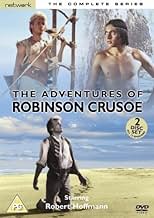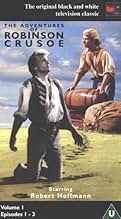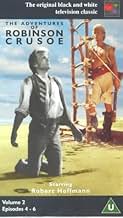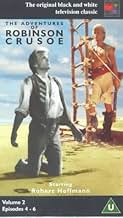Aggiungi una trama nella tua linguaAfter shipwreck, Robinson Crusoe survives alone on island, building shelter, reminiscing about past. With wildlife as company, months pass. One day he discovers footprint, making him wonder ... Leggi tuttoAfter shipwreck, Robinson Crusoe survives alone on island, building shelter, reminiscing about past. With wildlife as company, months pass. One day he discovers footprint, making him wonder if he's still alone.After shipwreck, Robinson Crusoe survives alone on island, building shelter, reminiscing about past. With wildlife as company, months pass. One day he discovers footprint, making him wonder if he's still alone.
Sfoglia gli episodi
Recensioni in evidenza
The summers of the late 60's and early 70's when I was a little girl always seemed so much nicer than now and I have often wondered was it just childish optimism that makes me remember them with such affection. It was this affection that made me buy this almost iconic memory of that time, although I was fearful it would not be as I remembered it. I was so wrong, in fact, Robinson Crusoe turned out to be much better that I recalled. I instantly remembered the opening titles, short and sweet, but, I hadn't appreciated how well the story was told; plain,simple and extremely maturely for a children's programme, they understood that children wanted intelligent viewing in those days, so much different to the bubblegum for the eye served up today. Robert Hoffmann is superb as Crusoe and I admit I didn't think of him as eye candy as a 10 year old, but, grown up me appreciates that aspect a lot more. The narration of Lee Payant is perfection and the rest of the cast all add up to great television viewing. I have seen comments about the quality of the print, it isn't that bad although the sound could have done with some cleaning up of the background artifacts, but, I'm not complaining, I'm just glad to have the opportunity to enjoy this wonderful series again. Sadly many kids today will not appreciate this series if it were shown again and that is their loss.
In the mid-sixties, in the UK at least, a memorable part of children's evening television was this adaption of Defoe's famous novel, spread over 12 x 25 minute episodes. Shot mainly on location in the Canary Islands,Robinson Crusoe' boasts fine location work and evocative camera work and, for many, it remains the definitive version for the small screen.
The first episode of the series deals with Crusoe's shipwreck and initial landing on his island. Flashbacks within this and the other first few episodes bring his story up to date, as he recalls his restless youth, then his apprenticeship as a law clerk, his running away, his capture into slavery, his adventures as a plantation owner and so on. This is a neat way of incorporating the progress of the original novel. Then his solitude is broken with the arrival of his companion, man Friday, and their relationship grows. So structurally the series divides into four: shipwreck and arrival; the establishment of Crusoe and his cave home, initially with flashbacks; the rescue and education of Friday then, a brief epilogue, with the two of them writing his story back in England. This last section, with the first shipwreck, neatly book ends' the main action. But what really binds all 12 episodes is the overwhelming presence of Crusoe, as narrator `author' of his own story, whose easy-going charm and inquisitiveness is an ideal embodiment of youthful ambition.
Crusoe's sojourn on his unnamed island is an adventure. But it is also an education, forced on him by circumstance. In his youth he is restless, `a rash young man, full of arrogance'. He disagrees with his father about the path his life should take (a dissatisfaction which eventually leads him to leave home). He prefers fencing to a settled career and wants travel, variety and excitement. By the end of his ordeal, he has achieved inner peace and enlightenment before returning to civilisation with regret, `full of peace and fulfillment' as he puts it. His belated recognition that Friday is human, with feelings too, his stable regard for one place (the island), these are signs of an emotional maturity - something conspicuously missing in his earlier years.
When away from his island Crusoe is normally restless, itching to start or to continue his adventuring. On his island, when this process is denied him, his thoughts are forced into different channels. He is forced to use his native skills to fashion his environment to survive. His painstaking and detailed attempts at self-sufficiency have an immediacy in presentation which still impresses today. Albicoco's cinematography echoes this development, being full of detail and atmosphere, and the scenes shot of Crusoe working with different materials have a peculiarly tactile nature. The hewing out of his canoe, building a chair, outfitting his cave, stripping the wreck each process wears a concern with texture, surface, light and shade that is, for want of a better word, beautiful. The black and white photography, the sand, the sunshine, the natural work materials, as well as Crusoe's own glistening body combine to create a sensual surface, amplified by the haunting score.
Crusoe's own values are straightforward: he wants to remain sane, a Christian, to make the best of it through the best use of his resources, and survive long enough to be rescued. Along the way he has a few interesting observations to make on life, normally whimsical and predicated around nationalistic lines. The English, he suggests, enjoy their privacy (an irony apparently lost on him), or as a race are not normally associated with cooking skills. These opinions are by-the-by. As in many ways, Friday provides the moral crux of the book, so it proves of this adaption.
For Crusoe - whose literal approach to civilisation and godliness is debatable (`Civilisation starts with trousers' he asserts at one point) - Friday's arrival is both a relief and a challenge. As a companion, he alleviates loneliness, but Crusoe's initial treatment of him as a servant rather than an equal is only rectified after Friday sulks' an profound absence amplified by the simultaneous death of Crusoe's dog. Friday is clean, bright, reliable, and a worthy friend. The absence of any blameworthy attributes (excluding his understandable moment of sloth following Crusoe's bungled moral instruction), makes his assimilation to the English' way of life relatively painless and allows Crusoe's maturity to occur. As one sign of this, the white man loses his vanity and grows a beard. Friday's admission into civilisation also allows a small debate on the virtues of war, gold and religion. What talk there is serves to increase Crusoe's contemplation of the deeper issues' and in our eyes makes of him a less shallow character. The two men's growing relationship also carries implicit homoerotic possibilities but, unsurprisingly, this is never made explicit.
Curiously, once seen, the English language version of this series is by far the most successful. Whether or not it was commissioned just for the BBC, I don't know, but a comparison with the original French-voiced production is a surprise. The memorable soundtrack is missing from the authentic' series, replaced by one more jazz based and, to these ears, far less evocative. Worse, Crusoe's distinctive voice and diction is that of a different actor. The tenor voice of the Lee Payant's dubbing in the BBC version encapsulates the tone and manner of a intelligent, resilient Englishman. The conversational style of his narration (which occupies almost all of the dialogue outside of the flashbacks and the debates with Friday) perfectly suits Crusoe's character and made his disappointments and introspection charming. The Austrian actor's real voice, for all his dramatic virtues, lapses back into anonymity. Worse, for this boy grown into an adult, Crusoe is no longer a friend to be revisited again and again.
The first episode of the series deals with Crusoe's shipwreck and initial landing on his island. Flashbacks within this and the other first few episodes bring his story up to date, as he recalls his restless youth, then his apprenticeship as a law clerk, his running away, his capture into slavery, his adventures as a plantation owner and so on. This is a neat way of incorporating the progress of the original novel. Then his solitude is broken with the arrival of his companion, man Friday, and their relationship grows. So structurally the series divides into four: shipwreck and arrival; the establishment of Crusoe and his cave home, initially with flashbacks; the rescue and education of Friday then, a brief epilogue, with the two of them writing his story back in England. This last section, with the first shipwreck, neatly book ends' the main action. But what really binds all 12 episodes is the overwhelming presence of Crusoe, as narrator `author' of his own story, whose easy-going charm and inquisitiveness is an ideal embodiment of youthful ambition.
Crusoe's sojourn on his unnamed island is an adventure. But it is also an education, forced on him by circumstance. In his youth he is restless, `a rash young man, full of arrogance'. He disagrees with his father about the path his life should take (a dissatisfaction which eventually leads him to leave home). He prefers fencing to a settled career and wants travel, variety and excitement. By the end of his ordeal, he has achieved inner peace and enlightenment before returning to civilisation with regret, `full of peace and fulfillment' as he puts it. His belated recognition that Friday is human, with feelings too, his stable regard for one place (the island), these are signs of an emotional maturity - something conspicuously missing in his earlier years.
When away from his island Crusoe is normally restless, itching to start or to continue his adventuring. On his island, when this process is denied him, his thoughts are forced into different channels. He is forced to use his native skills to fashion his environment to survive. His painstaking and detailed attempts at self-sufficiency have an immediacy in presentation which still impresses today. Albicoco's cinematography echoes this development, being full of detail and atmosphere, and the scenes shot of Crusoe working with different materials have a peculiarly tactile nature. The hewing out of his canoe, building a chair, outfitting his cave, stripping the wreck each process wears a concern with texture, surface, light and shade that is, for want of a better word, beautiful. The black and white photography, the sand, the sunshine, the natural work materials, as well as Crusoe's own glistening body combine to create a sensual surface, amplified by the haunting score.
Crusoe's own values are straightforward: he wants to remain sane, a Christian, to make the best of it through the best use of his resources, and survive long enough to be rescued. Along the way he has a few interesting observations to make on life, normally whimsical and predicated around nationalistic lines. The English, he suggests, enjoy their privacy (an irony apparently lost on him), or as a race are not normally associated with cooking skills. These opinions are by-the-by. As in many ways, Friday provides the moral crux of the book, so it proves of this adaption.
For Crusoe - whose literal approach to civilisation and godliness is debatable (`Civilisation starts with trousers' he asserts at one point) - Friday's arrival is both a relief and a challenge. As a companion, he alleviates loneliness, but Crusoe's initial treatment of him as a servant rather than an equal is only rectified after Friday sulks' an profound absence amplified by the simultaneous death of Crusoe's dog. Friday is clean, bright, reliable, and a worthy friend. The absence of any blameworthy attributes (excluding his understandable moment of sloth following Crusoe's bungled moral instruction), makes his assimilation to the English' way of life relatively painless and allows Crusoe's maturity to occur. As one sign of this, the white man loses his vanity and grows a beard. Friday's admission into civilisation also allows a small debate on the virtues of war, gold and religion. What talk there is serves to increase Crusoe's contemplation of the deeper issues' and in our eyes makes of him a less shallow character. The two men's growing relationship also carries implicit homoerotic possibilities but, unsurprisingly, this is never made explicit.
Curiously, once seen, the English language version of this series is by far the most successful. Whether or not it was commissioned just for the BBC, I don't know, but a comparison with the original French-voiced production is a surprise. The memorable soundtrack is missing from the authentic' series, replaced by one more jazz based and, to these ears, far less evocative. Worse, Crusoe's distinctive voice and diction is that of a different actor. The tenor voice of the Lee Payant's dubbing in the BBC version encapsulates the tone and manner of a intelligent, resilient Englishman. The conversational style of his narration (which occupies almost all of the dialogue outside of the flashbacks and the debates with Friday) perfectly suits Crusoe's character and made his disappointments and introspection charming. The Austrian actor's real voice, for all his dramatic virtues, lapses back into anonymity. Worse, for this boy grown into an adult, Crusoe is no longer a friend to be revisited again and again.
This magnificent 1964 production with the iconic Robert Hoffman in the lead remains for me the best programme ever to feature on children's TV. Everything about it is perfection, in particular the hauntingly beautiful music, which in my opinion remains the best score of any TV programme to this day.
I first saw this programme as a 9 year old in 1964 and have since watched it over and again, most recently at age 63, yet it has lost none of it's magic.
It has everything this classic tale could ever need and the fact that it is in black and white merely enhances its allure to the viewer.
Beautiful.
An evocative and entertaining adventure series aired originally on British television in 1965, produced by Paris-based Franco London Films, ORTF of France and Teledis and filmed in monochrome in the Canary Islands and Normandy - the abundant sun, light and tropical conditions of the former are fascinating . Young blond Salzburg-born actor Robert Hoffman gives a very adventurous flair performance as the idealistic Crusoe. The music features an early electronic-keyboard fugue strangely reminiscent of '70s new wave bands Television and Joy Division. The fine Yorkshire towns of York and Hull are mentioned in the dialogue and the feel for 17th/18th-Century European old world charm - the time of those classical figures of the Enlightenment - Bach, Beethoven, Cook and Darwin - when England was closer to France and Europe is evident. This series stands for naturalistic and flairful children's television.
I have just watched this again for the first time since it appeared on TV which has to be almost 40 years ago. Although a nostalgic trip back in time, this version will always stand the test of time. The black and white monochrome gives a timeless quality which sometimes colour cannot.
The day to day detail of Robinson Crusoe's mind-numbing existence and how he is able to overcome the many obstacles taken for granted is brilliantly worked. By inter-cutting flashbacks until the time when his life on the island begins to take shape, momentum is never lost.
The haunting musical score adds an integral dimension to the overall fascination of the series.
The French production team and main actor Robert Hoffman deserve much praise for the achievement created here. Not only a cult classic, this TV series, like the book, is now one all of its own.
The day to day detail of Robinson Crusoe's mind-numbing existence and how he is able to overcome the many obstacles taken for granted is brilliantly worked. By inter-cutting flashbacks until the time when his life on the island begins to take shape, momentum is never lost.
The haunting musical score adds an integral dimension to the overall fascination of the series.
The French production team and main actor Robert Hoffman deserve much praise for the achievement created here. Not only a cult classic, this TV series, like the book, is now one all of its own.
Lo sapevi?
- QuizIn the series, the stay on the island lasts 6 years, 2 months and 19 days. In the novel, however, Crusoe remains on the island for about 28 years.
- BlooperRobinson Crusoe says that Anne Bonny was hanged on November 17, 1674. However, Anne Bonny was not born until 1697 or 1698.
- ConnessioniFeatured in Paws, Claws & Videotape (2010)
I più visti
Accedi per valutare e creare un elenco di titoli salvati per ottenere consigli personalizzati
- How many seasons does The Adventures of Robinson Crusoe have?Powered by Alexa
Dettagli
- Tempo di esecuzione1 ora 25 minuti
- Colore
- Mix di suoni
- Proporzioni
- 1.33 : 1
Contribuisci a questa pagina
Suggerisci una modifica o aggiungi i contenuti mancanti

Divario superiore
By what name was Les aventures de Robinson Crusoë (1964) officially released in Canada in English?
Rispondi























